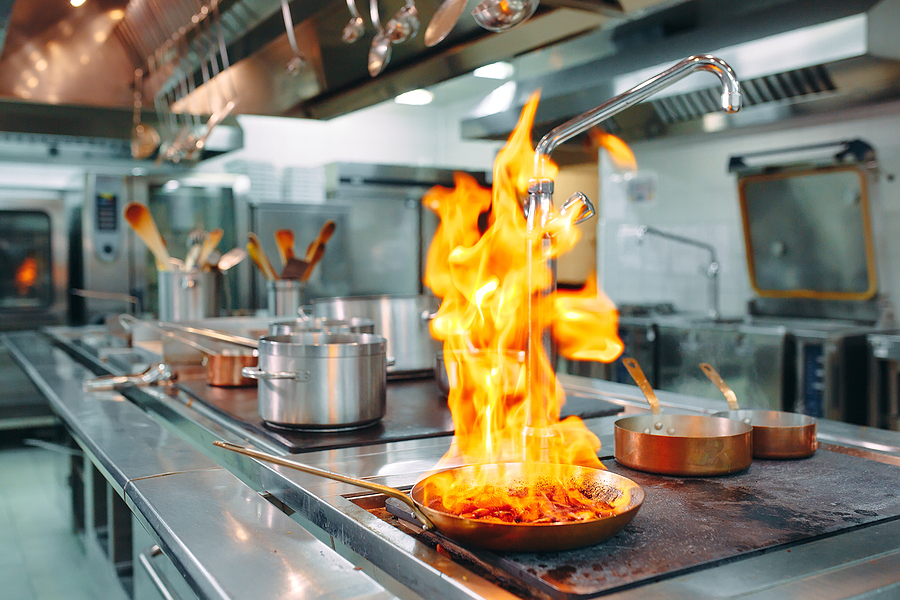According to the National Fire Protection Association (NFPA), there are nearly 8,000 + commercial kitchen fires a year on average. A number of the fires result from cooking equipment, others from bad wiring or unattended open flames.
A fire in a restaurant can easily escalate into a catastrophe. Fires in a commercial kitchen, with kitchen staff rushing to and fro, hot equipment – fryers, and griddles, among other hot surfaces – in close proximity, and flammable agents such as oil in use, can be particularly challenging to contain and put out.
Fires can inflict thousands of dollars in property damage and force a restaurant to close for weeks – or forever – if they’re not caught soon enough. The most effective way to put out a kitchen fire is for it not to happen in the first place.
These are some commercial kitchen fire safety measures:
How to Prevent Kitchen Fires
The tools needed to put out a fire are often present in a commercial kitchen, but there are action steps business owners can take to prevent them from starting. If you are cooking in a kitchen, there are a number of methods to extinguish a fire:
- Practice Safety First: Safety is everyone’s responsibility, so be sure to educate and regularly train both your front-of-house and kitchen staff on how to identify and remedy fire hazards, how to respond should a fire occur, and they should know what to do to evacuate the establishment if a fire occurs. And when everybody on the team focuses on safety, incidents like fire are reduced.
- Maintain A Clean Kitchen: This is a very simple and easy rule for residential and commercial kitchens – keep tidy. Most kitchen fires happen when a combustible item like a towel or food container catches fire from an open flame. Cooking oil and grease should be kept with cooking equipment to prevent a grease fire.
- Check Equipment: Kitchen fires are the result of defective electrical wiring, the second leading factor for kitchen fires after cooking equipment. Inspect all wires and cords to ensure that they’re not frayed or spliced. If you notice something not working as it should unplug the unit right away and contact a professional to repair or replace the item. Inspection of the exhaust systems also should be done periodically, to ensure that these are functioning correctly.
- Install an Automatic Fire Suppression System: An automatic fire suppression system is the equivalent of having a firefighter on call. The systems are programmed to release chemicals the douse the fire, and to cut off fuel or an electrical source to surrounding hardware. The equipment should be established by a professional company and maintained as needed for proper function.
- Buy a Class K Fire Extinguisher: It never hurts to be prepared. Restaurants must also have a K class fire extinguisher in a convenient location where kitchen people are able to get hold of it. Class K extinguishers are intended for fires involving vegetable oils, animal oils, or fats in cooking appliances, in kitchen work areas, and cooking operations; these extinguishers are generally found in commercial kitchens. This extinguisher is not the same as Class ABC extinguishers for different fire types.
Common Causes of Kitchen Fires
Because of the large quantities of food prepared, and equipment used, commercial kitchens have a higher risk for fire than most kitchens found in a residence. Typical Causes of Fires in Restaurant Kitchens:
Cooking Oil and Grease Traps: It is one of death: if you put it in a trash can, it may attract vermin, clog up the landfill, is prone to possibly able to be used in bakeries later, and it is a potential trap fire hazard. Too much oil or a grease trap that is clogged can rapidly ignite near open flames.
Blocked Exhaust Hood Filters: Exhaust hoods are there to remove extra smoke, grease, and gas. Failure to clean the hood filters on a regular basis may result in the flash fire of the grease trapped thereon.
Gas Leaks: Gas leaks and the fire they potentially result in could arguably be the worst type of emergency for a restaurant. Not only would your restaurant’s equipment or kitchen get damaged, but you also would put everyone in the restaurant at serious risk.
Circuit, Wire, Outlet: Electrical fires are the result of a circuit, wire or outlet short something fails to pass a long electrical push, projecting a hot spark or heat or a flame into close surroundings. Electricity cause 21% of all restaurant fires according to NFPA.
Commercial Fire Damage Prevention
We know the devastation a fire can cause a business at Brazas Fire. Fire can spread from one building to another quickly and cause thousands, if not hundreds of thousands, in damage.
Our trained Fire Risk Assessment team has been in the industry for over 15 years, our experts have been helping business owners stay fire safe for years and years.
We’re here for you, in Albuquerque and throughout New Mexico. We can get you back on your feet fast and help you to begin the rebuilding process!
